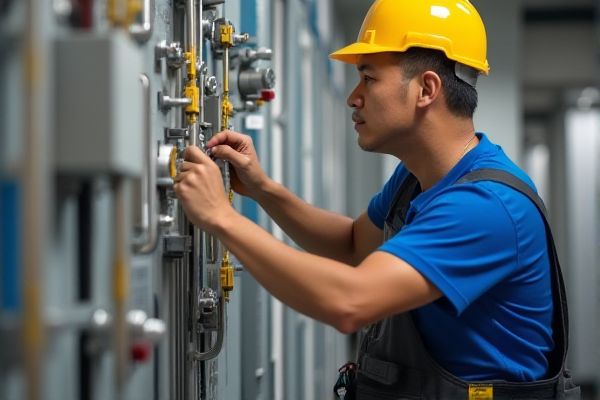
The demand for electricians in the Philippines is steadily rising, driven by ongoing infrastructure development and residential construction projects. Job opportunities are available across various sectors, including commercial buildings, residential areas, and industrial plants, making it a versatile career choice. Many companies seek certified electricians who possess knowledge of electrical systems, safety protocols, and relevant regulations. Prospects for advancement are promising, with potential roles in supervisory positions or specializing in renewable energy systems as the industry evolves.
Job Description
Electrician jobs in the Philippines typically involve the installation, maintenance, and repair of electrical systems in various settings, including residential, commercial, and industrial environments. You may be responsible for reading blueprints, troubleshooting electrical issues, and ensuring compliance with safety standards and codes. Many employers value skills in wiring, circuit design, and familiarity with renewable energy technologies. Opportunities for electricians are expanding in the country, driven by ongoing infrastructure developments and the rising demand for electrical expertise.
Requirement
Electrician jobs in the Philippines typically require a high school diploma or equivalent, along with relevant vocational training. Certification from the Technical Education and Skills Development Authority (TESDA) is often necessary, as it validates your skills and knowledge in electrical systems. Employers may also seek candidates with experience in installation, maintenance, and troubleshooting of electrical equipment and wiring. A valid driver's license can be an asset, especially for positions that involve traveling to different job sites.
Salary and Perks Expected
Electrician jobs in the Philippines typically offer competitive salaries that can range from PHP 15,000 to PHP 30,000 per month, depending on experience and location. Your earning potential increases with specialized skills, such as industrial or commercial electrical work. Many companies provide additional perks, including health insurance, overtime pay, and opportunities for professional development through training programs. The demand for skilled electricians in the country is on the rise, making these positions not only rewarding but also stable career choices.
Similar Job Names
- Residential Electrician
- Commercial Electrician
- Industrial Electrician
- Electric Lineworker
- Maintenance Electrician
- Construction Electrician
- Electrical Technician
- Control Systems Electrician
- Renewable Energy Electrician
- Electrical Inspector
- Electrical Project Manager
- Electrical Foreman
- Low Voltage Electrician
- High Voltage Electrician
- Electric Motor Repairer
Job Expectation Concept
Electrician jobs in the Philippines require a strong understanding of electrical systems, wiring, and safety protocols to ensure quality and safety in installations and repairs. Responsibilities often include troubleshooting electrical issues, maintaining equipment, and adhering to local regulations and codes. Technicians must possess relevant certifications and, in many cases, formal training to enhance their skills and knowledge. Opportunities in this field are growing, especially with the increasing demand for electricity and infrastructure development throughout the country.
Career Advantage and Weakness
Electrician jobs in the Philippines offer significant career advantages, including high demand for skilled professionals due to ongoing infrastructure development and a growing economy. Competitive salaries and opportunities for advancement in specialized fields, such as renewable energy or industrial systems, enhance job appeal. Despite these benefits, some weaknesses include the physical demands of the job and potential exposure to hazardous conditions without proper safety measures. You should also consider the necessity of continuous education to keep up with technological advancements and regulatory changes in the electrical industry.
Important Thing Must Know
Electrician jobs in the Philippines are in high demand due to the country's booming construction and infrastructure development sectors. In urban areas, skilled electricians can find opportunities in residential, commercial, and industrial projects, often with competitive salaries and benefits. To pursue a career as an electrician, completing an appropriate vocational training program or apprenticeship is essential to gain the necessary skills and knowledge. The industry often requires various certifications, including the National Certificate II in Electrical Installation and Maintenance, which ensures compliance with safety standards. Staying updated with the latest technologies and trends in electrical systems can greatly enhance your job prospects and career advancement in this field.
Alternative Career Options
Electricians in the Philippines can explore a variety of alternative career options that leverage their technical skills and expertise. Positions such as maintenance technician, electrical inspector, or project manager in construction are viable pathways, offering opportunities to utilize your knowledge in different environments. Additionally, roles in renewable energy sectors, like solar installation or wind turbine maintenance, are expanding as the country shifts towards sustainable energy solutions. Upskilling through certifications in specialized areas can enhance your employability in these emerging fields.
Companies List
- Meralco
- Philippine National Oil Company (PNOC)
- San Miguel Corporation
- BDO Unibank
- Ayala Corporation
- Globe Telecom
- SM Supermalls
- Jollibee Foods Corporation
- DMCI Holdings
- Robinsons Land Corporation
List of Ideal City
Manila, the capital city of the Philippines, offers a vibrant job market for electricians, thanks to its rapid urban development and numerous construction projects. Cebu City also presents excellent opportunities, as it is a major hub for commerce and tourism, leading to increased demand for electrical services. Davao, known for its robust economy and ongoing infrastructure development, is another prime location where electricians can find steady employment. In these cities, finding jobs in residential, commercial, and industrial sectors can ensure your career flourishes.
 jobs-philippines.com
jobs-philippines.com